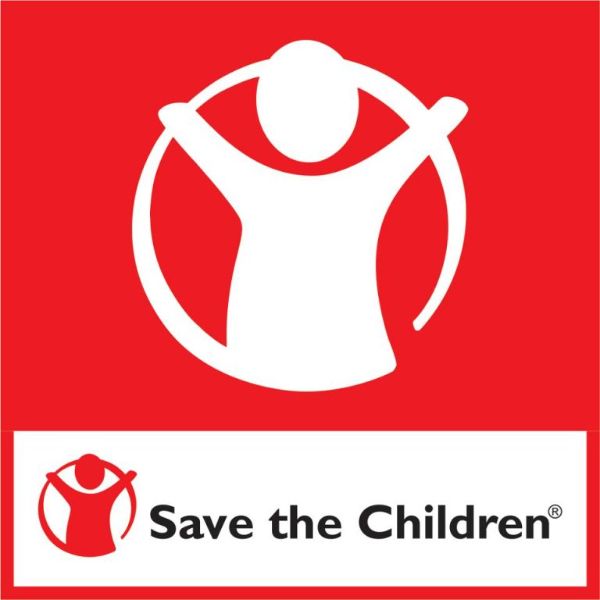
TERMS OF REFERENCE FOR GBV SAFETY AUDIT ASSESSMENT BHA PROJECT INTERVENTION SITES IN AWDAL REGION OF SOMALILAND
Job Description
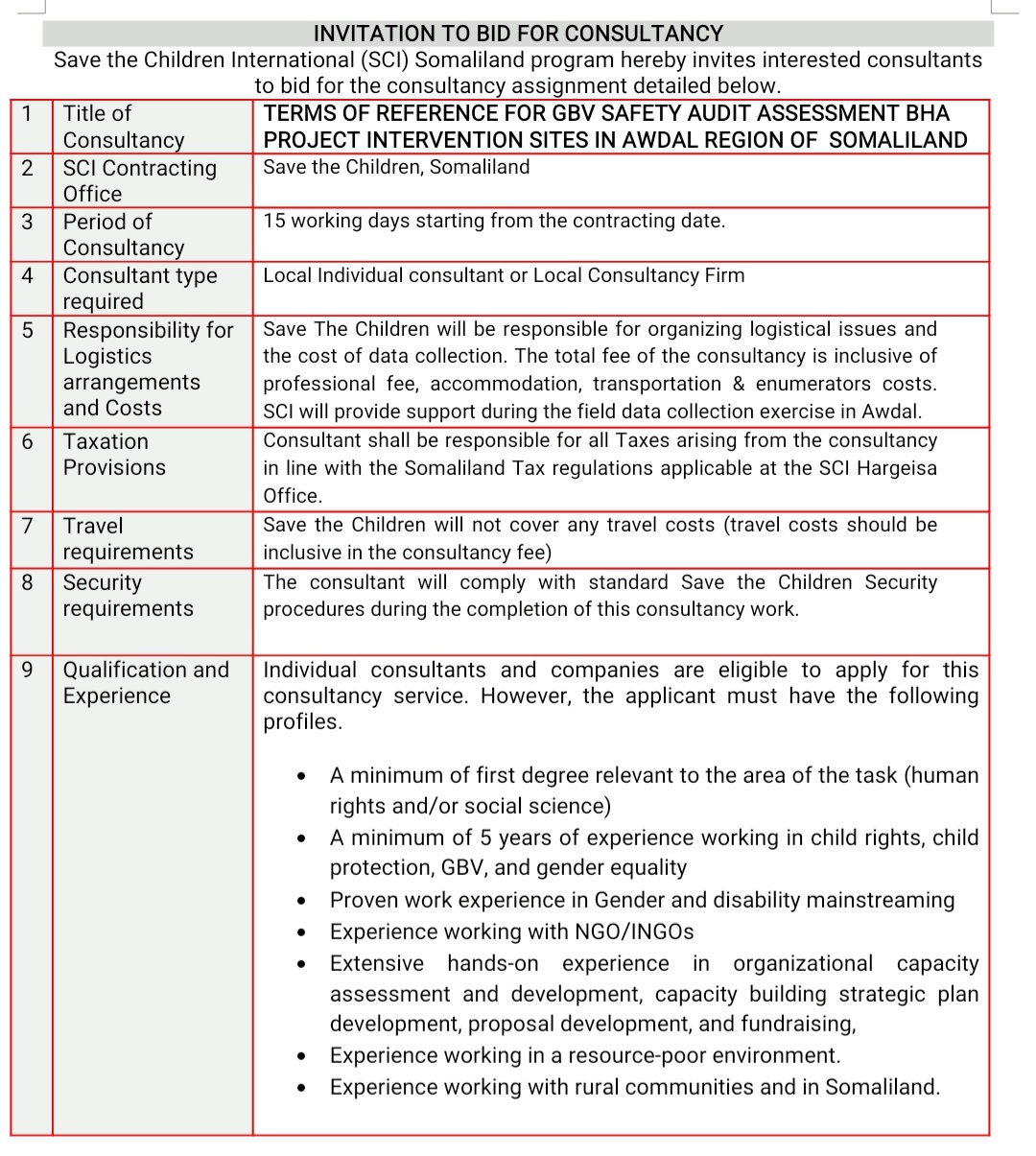
TERMS OF REFERENCE FOR THE GBV SAFETY AUDIT ASSESSMENT UNDER THE BHA PROJECT INTERVENTION SITES IN AWDAL REGION OF SOMALILAND.
- Background
GBV is a global problem and exists in a range of different contexts. Displacement can often be contributing factor to GBV as community protective mechanisms may be weakened or destroyed. For example, living in overcrowded shelters can lead to increased domestic violence, early or forced marriage may be used as a measure to address economic hardship, and site layout can increase the risk of rape or sexual harassment when sanitation facilities are not separated by sex, lighten at night or built-in secure locations. As GBV is underreported worldwide, humanitarian workers, including CM Mobile Teams, should always assume that GBV is happening in their area or sites of operations.
Safety audits are a crucial tool Camp management teams must assess, understand, and map the risk of GBV in their sites of operations, and therefore advocate for a safer communal living environment for the displaced population. Safety audits are typically carried out in camps or settlements during displacement as a means of assessing GBV risks related to the physical structure and layout, resource availability, and provision of humanitarian services and assistance. Safety audits enable humanitarian actors to determine observable risks and assess specific vulnerabilities of women, girls, boys, and men to those identified risks and to identify actions to be taken to reduce those risks and/or vulnerabilities.
Safety Audits are carried out through a mix of observation and consultation, both in the form of KII or FGD with Community members. Safety audits are particularly important to improve safety in the sites, monitor and promote equal and meaningful access to resources, services, and facilities and ensure that they do not harm principle is respected. Moreover, Safety audit exercises can increase community participation in service delivery, and give chances to women, girls, men, and boys to share their different perspectives and needs that must be considered during the delivery of humanitarian assistance.
- Purpose of the GBV Safety Audit
The aim of the assessment is to monitor GBV risks, vulnerability, and access to GBV quality services in the camps and develop an action plan for the identified risks. To also examine the effectiveness of mitigation measures that are in place during humanitarian assistance. The safety audit exercise collected information related to Camp Layout, WASH, Shelter, Education, Nutrition, Health and Security, and other services.
- Specific objectives of the GVB Safety Audit
The specific objectives of this final evaluation are to:
- Identify protection – GBV risks and vulnerabilities of women, girls, men, and boys in the camps including when accessing humanitarian assistance.
- Examine the availability, quality, and access of GBV services in the camps.
- Assess gender-related barriers and family decision-making roles concerning control of, and access to resources both at the household and community level.
- Evaluate the knowledge and awareness of project staff and community members regarding gender equality, GBV prevention, and response, to provide targeted capacity-building and training to address any identified gaps.
- Based on the findings from the assessment, develop a comprehensive and targeted action plan to mitigate identified GBV risks.
- Share GBV sub-cluster on the finding report and action plan to disseminate the information with the concerned clusters for follow-up.
- Scope of the GBV Safety Audit
The GBV safety audit assessment will cover three districts in the Awdal region of Somaliland (Hayayaabe, Haddi IDP, Tuurka, Boon, Gargaara, Garba-dadar). However, the assessment process will draw a representative sample from the target considering proportionality for the target groups.
An external consultant under the guidance of the SCI CP/CRG programme team will lead the whole process of the assessment. The consultant will develop the data collection tools, train the data collection team, coordinate the field data collection process, interpret the data, and produce a comprehensive GBV safety audit report.
- Methodology of the final evaluation
The assessment will employ a qualitative method to provide in-depth understanding on GBV risks related to the physical structure and layout, availability and accessibility of services, knowledge and attitude and provision of humanitarian services. Additionally, there will be essential tools for this assessment that SCI will share with the selected candidate when developing the inception report such as (1) GBV qualitative assessment tools and (2) GBV and Child Protection Emergency Respond Checklist.
- Focus group discussion (FGD): old adolescent girls and boys, women of reproductive age, older women, men, and women living with disability (FGDs will be separated by sex and age group)
- As Save the Children is a child rights organization, the consultant should make sure that girls and boys are being consulted by using child-friendly and gender-sensitive methodologies; special attention should be put to ensuring that girls, women, and people with disabilities (both adults and children) able to participate in a safe manner. Everybody’s participation will be voluntary, meaningful, safe, and inclusive.
- KIIs will be conducted with key stakeholders, including community leaders, community committees, service providers, project staff, and relevant local authorities. These KIIs will provide valuable insights into the site, existing gender dynamics, and potential GBV risks. Additionally, KIIs will help identify the knowledge and attitude on GBV prevention and response.
- Observation checklist to identify gender barriers, GBV risks of women, girls, boys and men in the camp. This should gather information on the sectors (health, nutrition, FSL, WASH and protection). The checklist should also capture the services available for GBV response at the health facilities.
- Deliverables
The consultant is expected to perform through 5 phases – preparation, inception, research, reporting, and follow-up and dissemination. Some key activities during these phases include the development of research tools, document review, data collection, analysis/interpretation, report writing, and presentation to key stakeholders as below:
- Inception report:
The consultant is expected to produce an inception report detailing the following:
- A detailed methodology for the review, including the tools to be used in the review.
- The consultant is expected to calculate the sample size to be assessed (both cluster level and individual sample size), and lead on the Data collection, cleaning, analysis, and reporting.
- The proposed team members and a description of their respective roles.
- Complete the work plan for the entire review period.
- Proposal for the final report layout
- Draft report and GBV Risks Mitigation Action Plan:
The consultant is anticipated to generate the first draft report by the end of data collection and analysis after the inception of the assignment. This draft report and the GBV mitigation action plan will be presented and discussed with key stakeholders, including the project teams, and technical specialists. Inputs from the discussions will be incorporated into the final report and plan.
- Final Report and GBV Risks Mitigation Action Plan:
- The final report and the GBV risk mitigation plan shall be submitted within the timeframe after addressing comments on the draft report. This report will be a detailed report covering items outlined in the scope of the TOR with special attention to main findings and conclusions, possible challenges and mitigations, gaps, and recommendations: Prepare a PowerPoint presentation, summarizing the key findings from the assessment in a design layout, and submitted together with the final report. The consultant will also make a presentation of the key findings through a validation meeting and collect comments from the different stakeholders to justify or address.
- The consultant should also share photos with GPS coordinates from the assessed location, analysis, and raw data (KII and FGD should be scripted by the consultant for future use).
- Duration of the Assignment
The assessment will last 15 days. Starting from the date signed off the contract. This included data collection, Interpretation of the findings and report writing.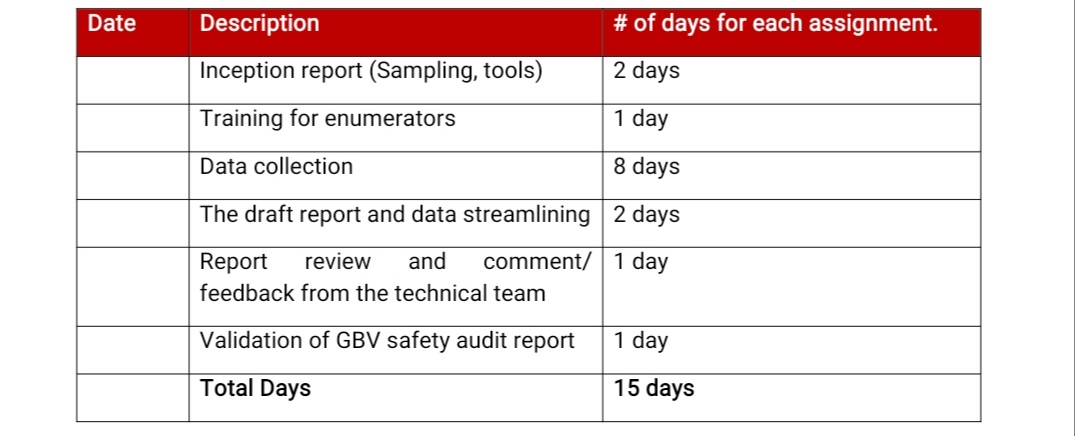
- Roles and responsibilities
- a) The Consultant:
- Referring the relevant terms of reference, the consultant will develop a technical proposal with a clear methodological approach, a work plan, budget, and tools that will be approved by the SCI CP/CRG team.
- Develop a detailed work plan for the study and share with Save the Children for input and approvals.
- Produce an inception report demonstrating his/her capacity to handle the consultancy by explicitly explaining his/her understanding of the TOR that he/she deems sufficient serve the study purpose.
- The inception report should exhaustively cover the proposed design and methodology, analysis plan, suggested final report format and in line with the agreed evaluation design and data collections tools at global level.
- Train all data collection team (enumerators) members on the use of the tools and the agreed methodology.
- Conduct GBV Safety Audit – fieldwork for the data collection on all outcome, output, and result indicators in line with approved methodology, data analysis, and interpretation in favor of the objectives of the evaluation.
- Analyse primary collected data in line with the study questions and draft a report accordingly.
- Share the draft final assessment report analysed datasets with the SCI CP/CRG team for inputs/feedback in a validation meeting.
- Upon satisfactory review of the draft report by the SCI CP/CRG programme team, the consultant will present and submit a comprehensive final assessment report in both hard and electronic copy to Save the Children.
- b) Save the Children:
Save the Children Somaliland will provide the following logistical support and guidance:
- Approve the design, methodology, and data collection tools for the final evaluation.
- Ensure prompt payment of professional fees and other costs arising from the contract.
- Provide guidance, input, and support during the exercise.
- Provision of venue, stationery, and refreshments for the one-day validation workshop.
- Reporting Arrangements
The consultant will report directly to the Save the Children office in Hargeisa. The CP/CRG Manager will be the focal person who will lead this exercise.
- Copyright and Intellectual Property Rights
The title rights, copyrights, and all other rights of whatever nature in any materials used or generated under the provisions of this consultancy will exclusively be vested with Save the Children Somalia/Somaliland Country Office. All products developed under this consultancy belong to the project exclusively, guided by the rules of the grant contract. Under no circumstances will the consultant use the information of this evaluation for publication or dissemination to any individual or organization without official prior written permission from the Save the Children Somalia/Somaliland Country Office.
- Organizational Roles and Responsibility
The consultancy will be contracted by and report to Save the Children in Somaliland. The project team and country office technical team will also support the final evaluation, providing necessary and available documents and information needed, they will also provide technical assistance.
Location: The consultancy will take place in the Awdal region of Somaliland.
- Terms and Conditions
Professional Fee: The consultant will come up with his/her own rate, which will be subject to negotiation within the bounds of donor requirements, market price, and set standards for SC in Somaliland. The consultant is expected to estimate all relevant costs for the exercise, including costs for data collectors, vehicle rent, venue, stationary, travel costs, and accommodation that he/she is expecting to incur while undertaking activities related to this evaluation.
- Code of Conduct
Save the Children's work is based on deeply held values and principles of child safeguarding, and it is essential that our commitment to children's rights and humanitarian principles is supported and demonstrated by all members of staff and other people working for and with Save the Children. Save the Children's Code of Conduct sets out the standards to which all staff members must adhere to, and the consultant is bound to sign and abide by the Save the Children’s Code of Conduct.
A contract will be signed by the consultant before the commencement of the action. The contract will detail terms and conditions of service, aspects of inputs, and deliverables. The Consultant will be expected to treat as private and confidential any information disclosed to her/him or with which she/he may come into contact during her/his service. The Consultant will not, therefore, disclose the same or any particulars thereof to any third party or publish it in any paper without the prior written consent of Save the Children. Any sensitive information (particularly concerning individual children) should be treated as confidential.
An agreement with a consultant will be rendered void if Save the Children discovers any corrupt activities have taken place either during the sourcing, preparation, and implementation of the consultancy agreement.
Skills and Qualifications
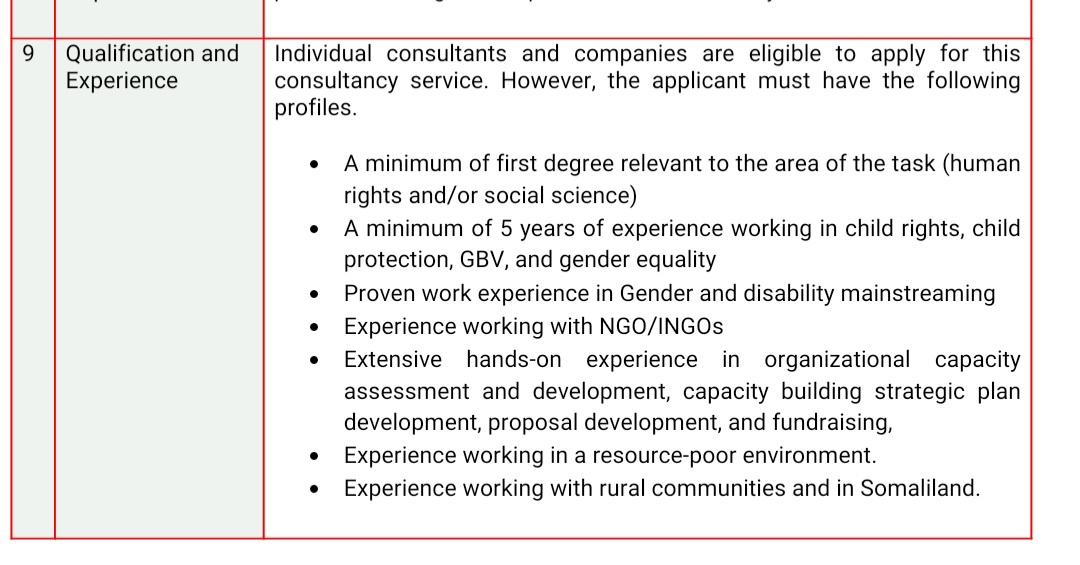
How to apply
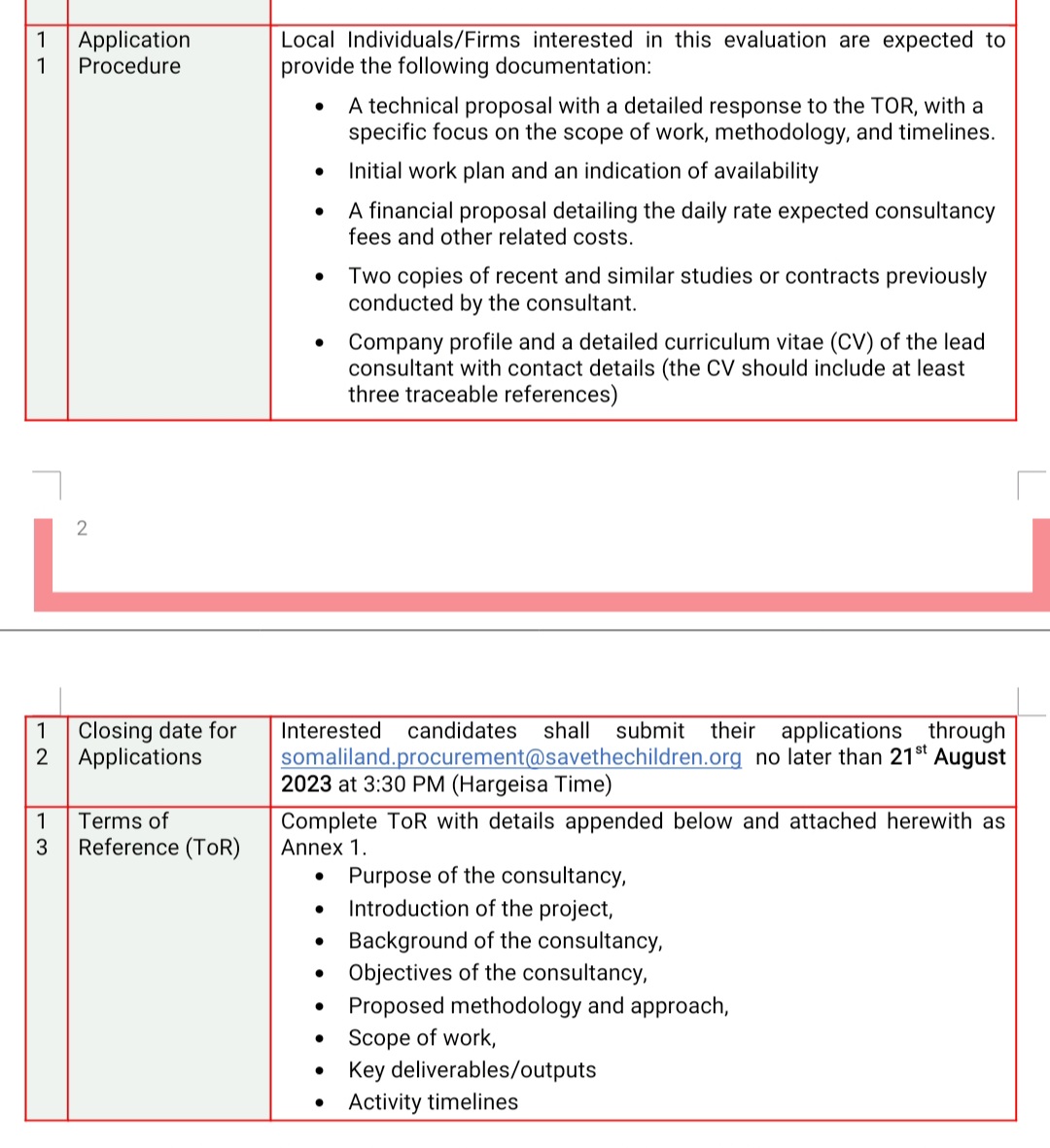
- Application Procedure and Requirements
Candidates interested in the position are expected to provide the following documentation:
- A technical proposal with a detailed response to the TOR, with a specific focus on the scope of work, methodology, and timelines.
- Initial work plan and an indication of availability
- A financial proposal detailing the daily rate expected cost related to this assignment.
- Two copies of recent and similar studies previously conducted by the consultant.
- Company profile and a detailed curriculum vitae (CV) of the lead consultant with contact details
Interested candidates shall submit their applications through [email protected] by no later than 21st August 2023 at 3:30 PM (Hargeisa Time)
PhoneUnspecified
.png)
